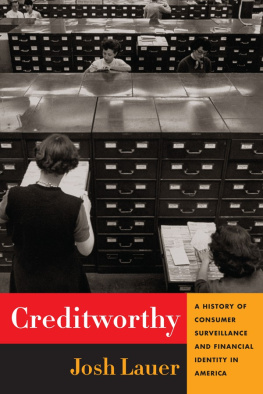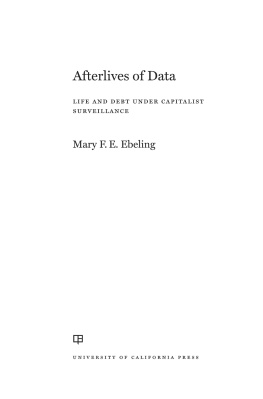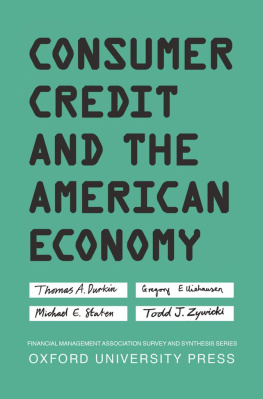If one must go into debt, then debts of gratitude are the best to accumulate. It is a pleasure to reckon the long columns of beneficenceinstitutional, intellectual, and personalthat have underwritten this work.
This project began at the University of Pennsylvanias Annenberg School for Communication, where I had the privilege to study with Joseph Turow, Barbie Zelizer, Oscar Gandy, and Katherine Sender. I was drawn to the Annenberg School by the work of Carolyn Marvin, whose cultural histories of technology inspired my own scholarly ambitions. I am lucky to have had Carolyn as a teacher, mentor, and friend.
I have also been fortunate to land among so many smart, generous colleagues at the University of New Hampshire. I am especially grateful to three department chairsLawrence Prelli, Joshua Meyrowitz, and James Farrellwho each went out of their way to help secure time and scarce resources in support of my research.
Financial support for this work was provided by the University of New Hampshire, including a Summer Faculty Fellowship from the Graduate School, a travel stipend from the Research and Engagement Academy, and an invaluable semester-long Center for the Humanities Faculty Fellowship. I also received a travel grant from the DeGolyer Library at Southern Methodist University to visit the J.C. Penney archives, where I enjoyed the expert assistance of Joan Gosnell. Thanks also to the interlibrary loan staffs at the University of Pennsylvania and the University of New Hampshire, and to Sharon Black at the Annenberg School library.
Portions of this book have been published elsewhere. A version of appeared as Making the Ledgers Talk: Customer Control and the Origins of Retail Data Mining, 19201940, in The Rise of Marketing and Market Research, edited by Hartmut Berghoff, Philip Scranton, and Uwe Spiekermann (Palgrave Macmillan, 2012). Material from several chapters appears in The End of Judgment: Consumer Credit Scoring and Managerial Resistance to the Black Boxing of Creditworthiness, in The Emergence of Routines: Entrepreneurship, Organization, and Business History, edited by Daniel M.G. Raff and Philip Scranton (Oxford University Press, 2017). Archival material from the R.G. Dun Collection is quoted with permission from Harvard Business Schools Baker Library.
My thinking about this project has been enriched by feedback from co-panelists and audiences at many conferences, including those sponsored by the International Communication Association, the National Communication Association, the Business History Conference, the Hagley Museum and Library, the Organization of American Historians, the History of Science Society, and the Economic and Business History Society. I am especially grateful to Claire Lemercier and Claire Zalc for the opportunity to share my work at cole Normale Suprieure in Paris; to Daniel Raff and Philip Scranton for including me in a workshop at the University of Pennsylvanias Wharton School; to Robert Hunt for bringing me to the Federal Reserve Bank of Philadelphia; to David Lyon and Sachil Singh for hosting me at Queens Universitys Surveillance Studies Centre; to Lana Swartz for involving me in a money-themed symposium at the University of Southern Californias Annenberg School for Communication and Journalism; and to Rowena Olegario for including me in a corporate reputation symposium at the University of Oxfords Sad Business School.
In addition to those already named, many others have guided my thinking and sharpened my arguments through conversations and, in many cases, through their own work. Thank you to Mark Andrejevic, Dan Bouk, Claire Brennecke, Rachel Bunker, Lendol Calder, Roger Chartier, Nora Draper, Marc Flandreau, Tarleton Gillespie, Lisa Gitelman, David Hiley, Chris Jay Hoofnagle, Caley Horan, Jennifer Horner, Daniel Horowitz, Louis Hyman, Richard John, Barbara Kiviat, Jessica Lepler, Kenneth Lipartito, Deborah Lubken, Bill Maurer, Elizabeth Mellyn, Gabriel Mesevage, Jeff Niederdeppe, David Park, John Durham Peters, Jamie Pietruska, Jefferson Pooley, Bill Simon, John Staudenmaier, Sean Vanatta, and Emily West. Extended discussions with two colleagues in particular, Craig Robertson and Richard Popp, introduced me to much valuable scholarship and never failed to buoy my enthusiasm for our peculiar subfields of media history. Thanks also to Charles Brown, Anthony Capaldi, Gary Chandler, Norm Magnuson, Corey Stone, and Chet Wiermanski for generously sharing their first-hand knowledge of the credit industry.
This book, for all of its shortcomings, is much better thanks to the feedback of two anonymous reviewers and the interventions of series editors Louis Hyman, Julia Ott, and Bethany Moreton, who went above and beyond the call of duty. Thanks also to Columbia editor Philip Leventhal for shepherding the work into publication.
Finally, none of this would be possible without the support and welcome diversions of my family. Thank you to my brothersDeakin, Judd, and Brettand to my parents, Al Lauer and Anne Fletcher. My deepest gratitude goes to my children, Sebastian and Zadie, whose love and company give me the greatest happiness.
ARCHIVAL AND MANUSCRIPT COLLECTIONS
David F. Linowes Papers, University of Illinois Archives, Urbana-Champaign, Ill.
J. C. Penney Archive, Southern Methodist University, Dallas, Tex.
John Wanamaker Collection, Historical Society of Pennsylvania, Philadelphia, Pa.
Massachusetts Historical Society, Boston, Mass.
R. G. Dun Archive, Baker Library, Harvard Business School, Cambridge, Mass.
SECONDARY SOURCES
Anderson, Allan H., et al. An Electronic Cash and Credit System . New York: American Management Association, 1966.
Anderson, Chris. The End of Theory: The Data Deluge Makes the Scientific Method Obsolete. Wired . June 23, 2008. http://www.wired.com/2008/06/pb-theory/. Accessed August 9, 2016.
Andrejevic, Mark. iSpy: Surveillance and Power in the Interactive Age . Lawrence: University Press of Kansas, 2007.
____ . Surveillance and Alienation in the Online Economy. Surveillance & Society 8, no. 3 (2011): 278287.
____ . The Work of Being Watched: Interactive Media and the Exploitative Work of Self-Disclosure. Critical Studies in Media Communication 19, no. 2 (June 2002): 230248.
Anthony, Robert N., and Marian V. Sears. Whos That? Harvard Business Review 39, no. 3 (MayJune 1961): 6571.
Arena, Joe. Framing an Ideology of Information: Retail Credit and the Mass Media, 19101930. Media, Culture & Society 18 (1996): 423445.
Atherton, Lewis E. The Problem of Credit Rating in the Ante-Bellum South. Journal of Southern History 12 (1946): 534556.
Augst, Thomas. The Clerks Tale: Young Men and Moral Life in Nineteenth-Century America . Chicago: University of Chicago Press, 2003.
Balleisen, Edward J. Navigating Failure: Bankruptcy and Commercial Society in Antebellum America . Chapel Hill, NC: Duke University Press, 2001.
Btiz-Lazo, Bernardo, Thomas Haigh, and David L. Stearns. How the Future Shaped the Past: The Case of the Cashless Society. Enterprise & Society 15, no. 1 (March 2014): 103131.
Beck, Ulrich. Risk Society: Towards a New Modernity . Translated by Mark Ritter. London: Sage, 1992.
Beniger, James. The Control Revolution: Technological and Economic Origins of the Information Society . Cambridge, Mass.: Harvard University Press, 1986.
Benson, Susan Porter. Counter Cultures: Saleswomen, Managers, and Customers in American Department Stores, 18901940 . Champaign: University of Illinois Press, 1986.
Berghoff, Hartmut, Philip Scranton, and Uwe Spiekerman. The Origins of Marketing and Market Research: Information, Institutions, and Markets. In The Rise of Marketing and Market Research , edited by Hartmut Berghoff, Philip Scranton, and Uwe Spiekerman, 126. New York: Palgrave Macmillan, 2011.
Black, Hillel. Buy Now, Pay Later . New York: William Morrow, 1961.
Next page








